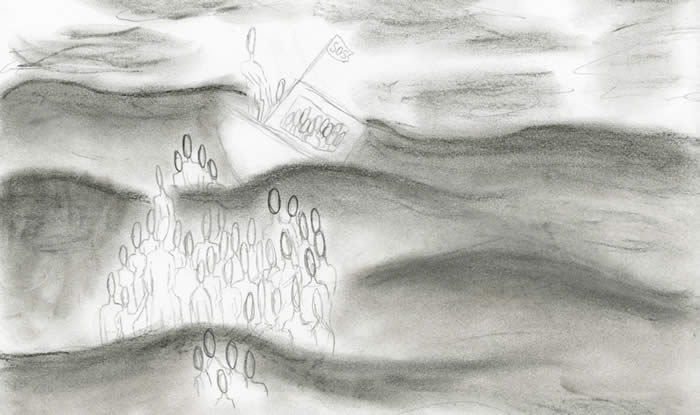

2014/2015
Where to Go?1979; My Tho, Tien Giang Province, Vietnam; and Terengganu, Malaysia April 1979 — the Vietnam War was over. North Vietnam had been victorious over South Vietnam. My mom was ten years old, and was getting ready to get on a boat to escape to freedom. Her parents dressed her in The day finally came; they left on a small boat. My mom remembers that the day was very humid — plus she was wearing three layers of clothes. First they arrived at a farmhouse, where they would stay until nightfall. Later they would board a bigger fishing boat that would take them to Malaysia. They had to board the boat at night so the government wouldn’t find out. It was pitch black, and my mom was climbing onto the boat when one of her shoes slipped off. She was so sad. She tried to look for it, but it was nowhere to be seen. It was the only memento she had of her cousin, who had the same shoes. When she sat down in the boat, she heard about people who had hidden their jewelry and money by sewing it into their clothes, in case they encountered pirates. A sick baby was also aboard. Many people tried to calm him down, but he wouldn’t stop crying. The next day my mom found out the baby had died during the night from a seizure. A day passed, and they encountered pirates. They were Thai fishermen trying to make some extra money. My mom had heard stories about pirates who would take the money of everyone on board and then kill them — or the pirates would destroy the boat’s engine so all the people would be adrift and die. Fortunately the pirates were intimidated because they were outnumbered by the men who had lined up on the deck. They left the boat unharmed. After three days and four nights the boat reached an island in Malaysia. My grandfather told the captain to poke holes in the boat so that the soldiers on the beach couldn’t send them back out to sea. My grandmother and my mom didn’t know how to swim, so my grandfather had to carry them to land. My mom said she saw soldiers who whacked people, even old men, with long bamboo sticks. That night they had nothing to sleep on, so they slept on the beach. The next day they were transported to a refugee island camp called Pulau Bidong. Eventually the Red Cross gave them the supplies they needed to survive. They were given blankets, tents, and weekly rations of food and water. My mom described the water around the island as crystal clear. She could walk almost a mile out and still be standing. My mom’s family spent five months on the island until they got their immigration papers to go to the capital of Malaysia. From Kuala Lumpur they took a plane to the United States, where they began a new life. Author and illustrator: Megan Nguyen; Missouri, USA
This copyrighted story and illustration may be copied for limited classroom use or reprinted in an article about The Grannie Annie.
Return to Vol. 10 Stories page
|
Built by Hen's Teeth Network
 layers — pajamas, a day outfit, and a red suit. On the boat, people weren’t allowed to bring anything but what they were wearing. They were all scared that the government would find out they were leaving and put them in jail.
layers — pajamas, a day outfit, and a red suit. On the boat, people weren’t allowed to bring anything but what they were wearing. They were all scared that the government would find out they were leaving and put them in jail.